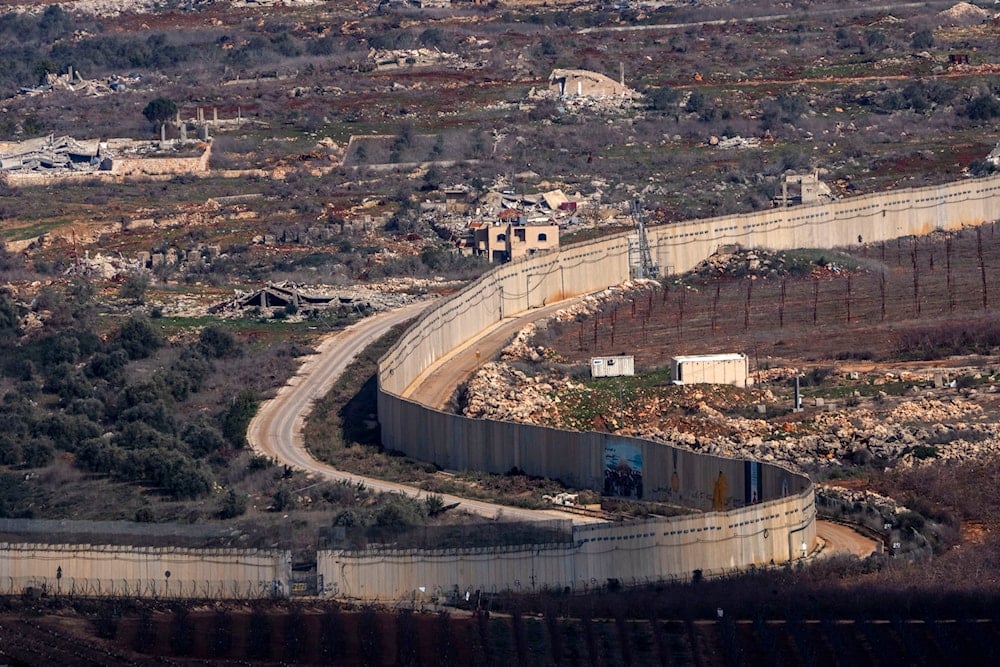LAF accuses 'Israel' of 'procrastination' in scheduled withdrawal
The Lebanese army accuses the occupation of "procrastinating" in the scheduled withdrawal, while"Israel" remains firm in its stance against withdrawing from Lebanon.
-

A wall marks the Palestinian-Lebanese border near the village of Odeisseh in southern Lebanon, as seen from northern occupied Palestine, on January 23, 2025. (AP)
The Lebanese army announced on Saturday its readiness to deploy forces in southern Lebanon, accusing the Israeli occupation of "delaying" its withdrawal ahead of a deadline set for the following day.
In a statement, the army said, "There has been a delay at a number of stages as a result of the procrastination in the withdrawal from the Israeli enemy's side," confirming it was "ready to continue its deployment as soon as the Israeli enemy withdraws".
The army urged people to "be cautious in heading back to the southern border areas, due to the presence of mines and suspicious objects left behind" by Israeli forces.
Under the ceasefire agreement in Lebanon, which took effect on November 27, the Lebanese army is to deploy alongside United Nations peacekeepers in the south as the Israeli occupation army completes its withdrawal over 60 days.
Hezbollah is set to withdraw its forces north of the Litani River, approximately 30 kilometers (20 miles) from the border, and dismantle any remaining military infrastructure in the south.
Israeli forces to remain in Lebanon beyond Jan 26
In parallel, Israeli Prime Minister Benjamin Netanyahu confirmed on Friday that "Israel" will not meet the 60-day deadline for its full withdrawal from southern Lebanon, set for Sunday, January 26, as stipulated in the ceasefire agreement.
In the first public acknowledgment of the delay, following weeks of speculation, Netanyahu’s office issued a statement explaining that the Israeli military's withdrawal process "is conditional on the Lebanese Army deploying in southern Lebanon and fully and effectively enforcing the agreement, while Hezbollah withdraws beyond the Litani.”
Netanyahu alleged that since Lebanon "has not yet fully enforced" its obligations under the ceasefire, "the phased withdrawal process will continue," further claiming "full coordination with the United States."
The premier claimed that the terms of the agreement were drafted "with the understanding that the withdrawal process may continue beyond 60 days."
It is worth noting that the ceasefire agreement between "Israel" and Lebanon is facing significant challenges, with continued Israeli shelling reported in Lebanon's southern border areas. Abd El Menem Shoqair, head of the Mays El Jabal municipality, described the extensive destruction in the region during an interview with RIA Novosti on Friday. He stated that homes and infrastructure in border towns have been heavily damaged despite the ceasefire.
Shoqair highlighted the devastating impact of ongoing hostilities, particularly in Mays El Jabal, a town in the Nabatieh province. "In Mays El Jabal about 55% of the buildings in the town are destroyed: 1,200 buildings completely destroyed, 1,800 damaged, 2,000 housing units destroyed," Shoqair said. Essential facilities, including hospitals, schools, and administrative buildings, have been rendered unusable, further discouraging displaced residents from returning.
He also raised concerns about additional risks, including the potential for Israeli forces to plant landmines and cluster bombs in the ruins. White phosphorus bombing has further contaminated agricultural lands and water sources, creating long-term environmental and health hazards for the local population.

 3 Min Read
3 Min Read








